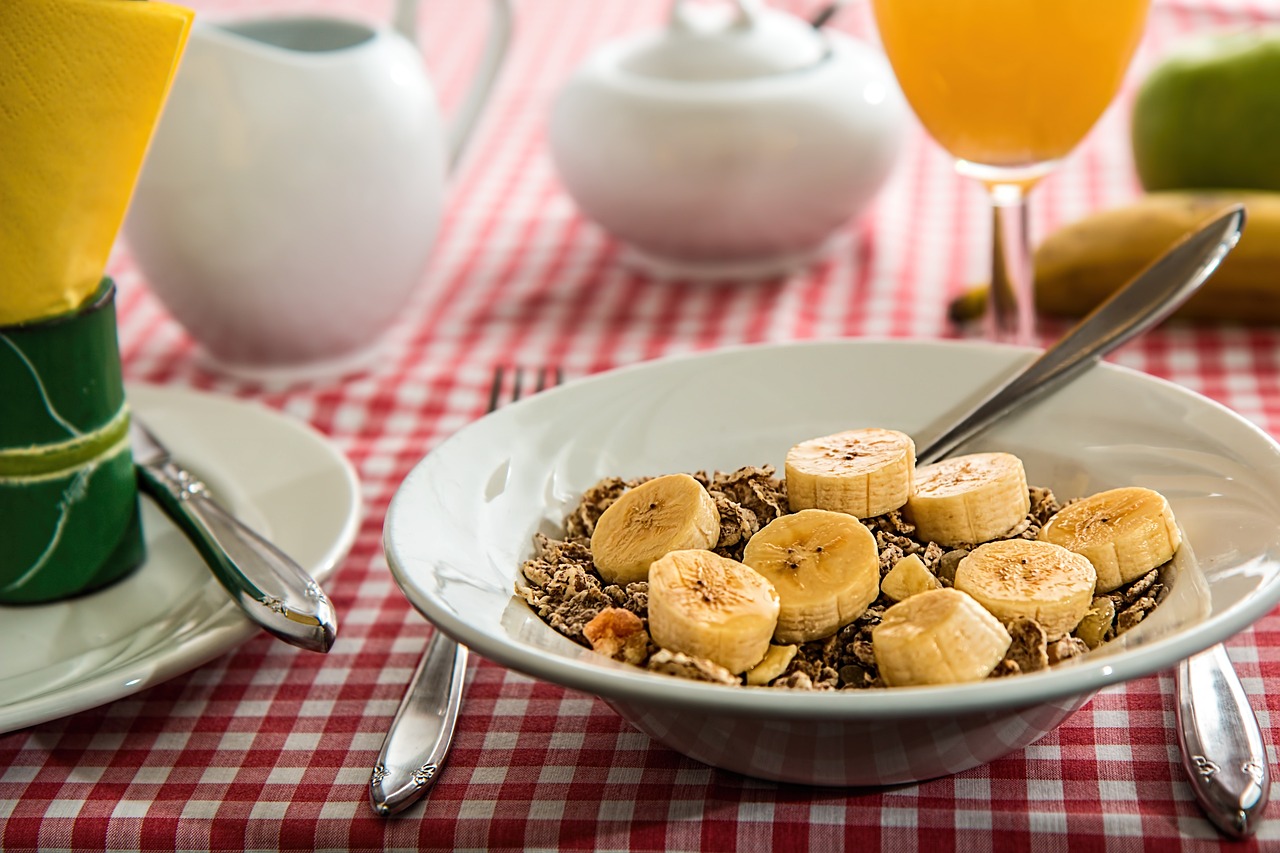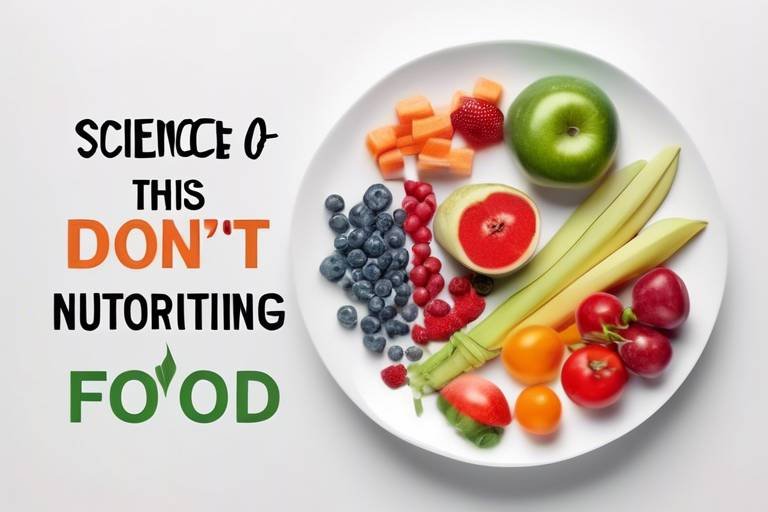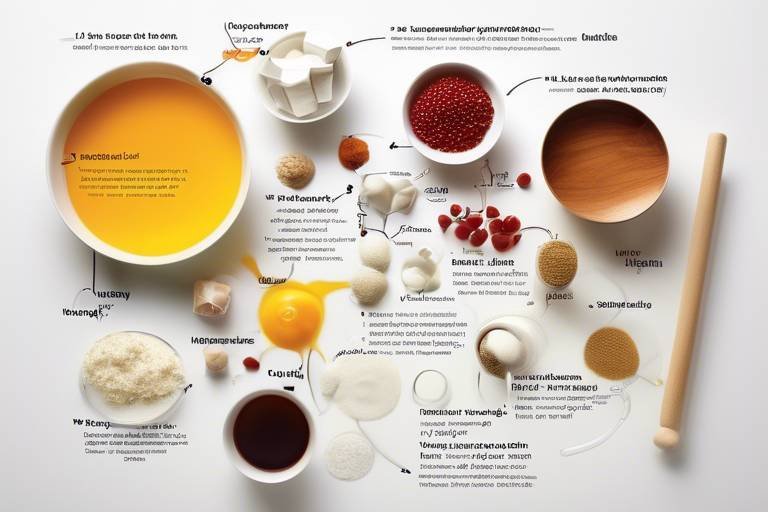The Biology of Plant-Based Diets - Health Benefits
In recent years, the buzz around plant-based diets has taken the health world by storm. But what exactly is fueling this trend? It’s not just a passing fad; the science behind plant-based eating reveals a treasure trove of health benefits that can transform your life. Imagine feeling more energetic, shedding those stubborn pounds, and even reducing your risk of chronic diseases—all by simply changing what’s on your plate! This article explores the scientific principles behind plant-based diets and their numerous health benefits, including improved nutrition, disease prevention, and overall well-being.
At its core, a plant-based diet emphasizes foods derived from plants. This means a colorful array of fruits, vegetables, whole grains, nuts, and seeds. But don't be fooled; it’s not just about being a vegetarian or vegan. There are various interpretations of plant-based eating. Some folks dive headfirst into a fully vegan lifestyle, while others may simply choose to incorporate more plant foods into their meals without completely eliminating animal products. The beauty of this flexibility allows everyone to find their own balance, making it easier to adopt a diet that suits their personal tastes and lifestyle.
One of the most exciting aspects of a plant-based diet is the wealth of nutritional components it provides. When you fill your plate with vibrant vegetables and wholesome grains, you're not just eating; you're nourishing your body with essential nutrients. From vitamins and minerals to proteins and healthy fats, plant-based foods are packed with everything your body craves. Let’s dive deeper into some of these vital components.
Vitamins and minerals are the unsung heroes of our diet, playing crucial roles in everything from energy production to immune function. A plant-based diet is often rich in key nutrients such as:
- Vitamin C - Found abundantly in citrus fruits and leafy greens, it boosts your immune system.
- Iron - Present in legumes and seeds, it’s essential for transporting oxygen in your blood.
- Calcium - Available in leafy greens and fortified plant milks, critical for bone health.
By making plants the star of your meals, you can easily meet your nutritional needs while enjoying a variety of delicious foods.
Have you ever heard of antioxidants? These powerful compounds found in plants help protect your body from oxidative stress, which can lead to chronic diseases. Phytochemicals, another group of beneficial compounds, contribute to the vibrant colors of fruits and vegetables. They not only enhance flavor but also provide protective health benefits. Think of them as your body's little warriors, fighting off inflammation and keeping you healthy.
Many people worry about getting enough protein on a plant-based diet, but fear not! There are plenty of excellent sources of protein that can help you build and maintain muscle. Some top plant-based protein sources include:
- Legumes - Beans, lentils, and chickpeas are not only high in protein but also rich in fiber.
- Nuts and Seeds - Almonds, chia seeds, and hemp seeds are great for snacking and adding to meals.
- Whole Grains - Quinoa, brown rice, and oats provide both protein and essential nutrients.
With so many options, it’s easy to meet your protein needs while enjoying a variety of flavors and textures.
Adopting a plant-based diet is associated with numerous health benefits that can significantly enhance your quality of life. From weight management to heart health, the advantages are compelling. Let’s explore some of the key benefits that come with this lifestyle choice.
One of the most remarkable benefits of a plant-based diet is its ability to aid in weight management. Thanks to their high fiber content and lower calorie density, plant-based foods can keep you feeling full and satisfied without overloading on calories. Imagine filling your plate with a mountain of veggies and grains while still losing weight! This is why many people find it easier to maintain a healthy weight when they switch to a plant-based diet.
Research indicates that plant-based diets can significantly improve heart health. Studies show that these diets can lower cholesterol levels and blood pressure, which are crucial factors in cardiovascular well-being. By ditching processed foods and focusing on whole, nutrient-dense options, you can give your heart the love it deserves.
Plant-based diets are linked to a reduced risk of chronic diseases. By incorporating more fruits, vegetables, and whole grains into your meals, you can help prevent conditions like diabetes, obesity, and even certain cancers. Think of it as a proactive approach to health—you're not just eating for today; you're investing in your future well-being.
1. Can I get enough protein on a plant-based diet?
Absolutely! There are numerous plant-based sources of protein, such as beans, lentils, nuts, and whole grains.
2. Will I miss out on essential nutrients?
Not at all! A well-planned plant-based diet can provide all the essential nutrients your body needs.
3. Is a plant-based diet suitable for everyone?
Yes, plant-based diets can be adapted to fit various lifestyles and preferences, making it accessible for most people.

Understanding Plant-Based Diets
When we talk about plant-based diets, we're diving into a world that revolves around foods derived from plants. This isn't just about munching on salads all day; it's a vibrant spectrum of delicious options! Imagine a plate filled with colorful fruits, hearty vegetables, whole grains, crunchy nuts, and nutrient-packed seeds. The beauty of a plant-based diet lies in its flexibility and diversity. You can choose to be a strict vegan, avoiding all animal products, or perhaps you prefer a more moderate approach, enjoying plant-based meals while still including some dairy or meat occasionally. The core principle remains the same: prioritize plant-derived foods to fuel your body and enhance your health.
But why should you consider adopting this lifestyle? Well, let’s think of it this way: if your body is a car, then food is the fuel that keeps it running smoothly. Just like premium fuel can make your car perform better, a diet rich in plants can optimize your health. Many people often wonder about the variations within plant-based eating. Some common types include:
- Vegan: Excludes all animal products.
- Vegetarian: Excludes meat but may include dairy and eggs.
- Flexitarian: Primarily plant-based but occasionally includes meat or fish.
Each of these approaches offers its own unique benefits, catering to different lifestyles and preferences. The flexibility allows individuals to tailor their diets based on personal health goals, ethical beliefs, and environmental considerations. By focusing on whole, unprocessed foods, plant-based diets can lead to a wide array of health benefits, making it a popular choice for many seeking to improve their nutrition.
In our fast-paced world, where convenience often trumps health, adopting a plant-based diet can be a refreshing change. It encourages you to cook more at home, explore new recipes, and become more mindful of what you consume. Plus, with the rise of plant-based alternatives, such as vegan burgers and dairy-free cheeses, incorporating these foods into your daily routine has never been easier. You can indulge in familiar flavors while still aligning with a healthier lifestyle.
So, whether you’re looking to make a complete switch or simply want to incorporate more plants into your meals, understanding the essence of plant-based diets is the first step towards a healthier you. The journey is not just about what you eat but also about how you feel. It's about creating a sustainable and enjoyable way of eating that nourishes your body and soul.

Nutritional Components of Plant-Based Diets
When it comes to plant-based diets, the nutritional components are as vibrant and diverse as the foods themselves. These diets primarily consist of fruits, vegetables, whole grains, nuts, and seeds, which are packed with essential nutrients. The beauty of a plant-based diet lies in its ability to provide a plethora of vitamins, minerals, and other beneficial compounds that are crucial for maintaining optimal health. In this section, we will explore the key nutrients found in plant-based foods and how they contribute to our overall well-being.
First and foremost, let’s talk about vitamins and minerals. These are the unsung heroes of our diet, playing vital roles in everything from energy production to immune function. For instance, leafy greens like spinach and kale are rich in vitamin K, which is essential for blood clotting and bone health. Similarly, fruits such as oranges and strawberries provide a generous dose of vitamin C, an antioxidant that boosts the immune system and promotes skin health. Here’s a quick overview of some key vitamins and minerals found in plant-based diets:
| Nutrient | Sources | Health Benefits |
|---|---|---|
| Vitamin A | Carrots, sweet potatoes, spinach | Supports vision and immune function |
| Vitamin C | Citrus fruits, bell peppers, broccoli | Boosts immunity, promotes healthy skin |
| Iron | Lentils, chickpeas, quinoa | Essential for blood production and energy |
| Calcium | Almonds, tofu, leafy greens | Important for bone health |
But that’s not all! Plant-based diets are also abundant in antioxidants and phytochemicals. These compounds are found in various fruits and vegetables and play a pivotal role in reducing inflammation and combating oxidative stress in the body. For example, the vibrant pigments in berries and tomatoes are not just for show; they contain powerful antioxidants like anthocyanins and lycopene that help protect our cells from damage. Including a variety of colorful fruits and vegetables in your diet is like giving your body a protective shield against chronic diseases.
Now, let’s dive into protein sources. Many people assume that a plant-based diet lacks adequate protein, but that couldn’t be further from the truth! There are countless plant-based protein sources that can help you meet your protein needs without relying on animal products. Foods like lentils, chickpeas, quinoa, and tofu are not only rich in protein but also come packed with other essential nutrients. For example, a cup of cooked lentils provides about 18 grams of protein along with a healthy dose of fiber, making it a powerhouse for muscle health and digestion.
Incorporating a variety of these protein sources into your meals can ensure you get all the essential amino acids your body requires. Plus, they often come with the added benefits of fiber and various vitamins and minerals, making them a smart choice for anyone looking to enhance their diet.
In summary, the nutritional components of a plant-based diet are not only diverse but also incredibly beneficial for our health. By focusing on whole, minimally processed foods, we can ensure that we are nourishing our bodies with the essential nutrients they need to thrive. So, whether you’re a seasoned vegan or just dipping your toes into the world of plant-based eating, remember that every meal is an opportunity to fuel your body with the goodness it deserves!
- What are the main benefits of a plant-based diet? - A plant-based diet can lead to improved heart health, weight management, and reduced risk of chronic diseases.
- Can I get enough protein on a plant-based diet? - Yes! There are many plant-based sources of protein, such as lentils, beans, tofu, and quinoa.
- Do I need to take supplements on a plant-based diet? - While many nutrients can be obtained from a well-planned plant-based diet, some individuals may benefit from supplements, such as vitamin B12.
- How can I start a plant-based diet? - Start by incorporating more fruits, vegetables, whole grains, and legumes into your meals, and gradually reduce animal products.

Vitamins and Minerals
When it comes to plant-based diets, the abundance of vitamins and minerals is one of the most compelling reasons to embrace this way of eating. These essential nutrients are like the building blocks of health, playing crucial roles in everything from energy production to immune function. Imagine your body as a complex machine; without the right fuel and parts, it simply won’t run efficiently. That’s where vitamins and minerals come into play!
Plant-based foods are rich in a variety of vitamins and minerals, each contributing to our overall well-being. For instance, fruits and vegetables are excellent sources of Vitamin C, which is vital for the growth and repair of tissues and helps in fighting off infections. Leafy greens, such as spinach and kale, are packed with Vitamin K, essential for blood clotting and bone health. On the mineral side, legumes and nuts provide a wealth of magnesium, which supports muscle and nerve function, while whole grains are a fantastic source of iron, critical for transporting oxygen in the blood.
Let’s break down some key vitamins and minerals found in plant-based diets and their health implications:
| Nutrient | Sources | Health Benefits |
|---|---|---|
| Vitamin C | Citrus fruits, bell peppers, strawberries | Boosts immunity, aids in collagen production |
| Vitamin K | Leafy greens, broccoli, Brussels sprouts | Supports bone health and blood clotting |
| Iron | Lentils, chickpeas, quinoa | Essential for oxygen transport in the body |
| Magnesium | Nuts, seeds, whole grains | Helps with muscle function and energy production |
But wait, there’s more! The synergy between these vitamins and minerals enhances their effectiveness. For example, Vitamin C improves the absorption of iron from plant sources, turning what might be a simple meal into a powerhouse of nutrition. This is why it’s crucial to incorporate a variety of colorful fruits and vegetables into your diet; each color represents different nutrients that can work together to boost your health.
In summary, the vitamins and minerals found in plant-based diets not only support bodily functions but also play a significant role in preventing chronic diseases. By nourishing your body with a diverse range of plant foods, you’re not just filling your plate; you’re investing in your long-term health. So, why not take a moment to reflect on your plate? Are you getting a rainbow of nutrients?

Antioxidants and Phytochemicals
When we think about the power of plants, we often overlook the hidden gems they contain: antioxidants and phytochemicals. These natural compounds are not just buzzwords in the health community; they are crucial players in the game of wellness. Antioxidants combat the harmful effects of free radicals in our bodies, which can lead to chronic diseases and aging. Imagine them as tiny warriors, tirelessly fighting off damage and keeping your cells healthy. Phytochemicals, on the other hand, are the colorful pigments and compounds found in fruits, vegetables, and whole grains that not only give plants their vibrant colors but also provide a plethora of health benefits.
So, what exactly do these superheroes of nutrition do? First off, they play a significant role in reducing inflammation. Chronic inflammation is like a slow-burning fire in your body, and if left unchecked, it can lead to a host of diseases, including heart disease and cancer. By incorporating a variety of plant-based foods into your diet, you can douse that fire with a rich supply of antioxidants and phytochemicals. Foods such as berries, leafy greens, and nuts are particularly high in these beneficial compounds.
Moreover, the health implications of these compounds are vast. Research suggests that diets rich in antioxidants and phytochemicals can lead to:
- Enhanced Immune Function: By neutralizing free radicals, antioxidants help strengthen your immune system.
- Improved Heart Health: Certain phytochemicals can lower cholesterol levels and improve blood vessel function.
- Reduced Risk of Cancer: Many studies have shown that a diet high in fruits and vegetables can lower the risk of various cancers.
Let’s not forget about the delightful flavors and textures that these foods bring to our plates! Eating a rainbow of fruits and vegetables not only enhances your meals but also ensures you are getting a wide array of these protective compounds. For instance, the deep red of tomatoes signals the presence of lycopene, a powerful antioxidant linked to reduced cancer risk, while the vibrant orange of carrots indicates a rich supply of beta-carotene, which is great for eye health.
In conclusion, embracing a plant-based diet rich in antioxidants and phytochemicals is like giving your body a daily dose of natural medicine. With every bite of a colorful fruit or vegetable, you are not just nourishing your body; you are also fortifying it against the challenges of modern life. So, the next time you reach for a snack, consider choosing a handful of berries or a crunchy bell pepper. Your body will thank you!
Q: What are antioxidants?
A: Antioxidants are compounds that help neutralize free radicals in the body, reducing oxidative stress and lowering the risk of chronic diseases.
Q: What are phytochemicals?
A: Phytochemicals are natural compounds found in plants that have health benefits, including anti-inflammatory and antioxidant properties.
Q: How can I include more antioxidants and phytochemicals in my diet?
A: You can include more by consuming a variety of colorful fruits and vegetables, whole grains, nuts, and seeds. Aim for a 'rainbow' of foods on your plate!
Q: Are supplements necessary for antioxidants?
A: While supplements are available, it’s generally best to obtain antioxidants and phytochemicals through whole foods, which provide a complex mix of nutrients.

Protein Sources
When it comes to plant-based diets, one might wonder how to get enough protein. After all, protein is often touted as a crucial building block for our bodies, essential for muscle repair, immune function, and overall health. The good news is that there are plenty of plant-based protein sources that can meet your dietary needs without the reliance on animal products. In fact, many plant foods are surprisingly rich in protein, allowing you to maintain a balanced diet while enjoying a variety of delicious meals.
Let’s break down some of the top sources of plant-based protein that you can easily incorporate into your daily meals:
- Legumes: Beans, lentils, and chickpeas are not only high in protein but also packed with fiber, which aids in digestion and keeps you feeling full. A cup of cooked lentils contains about 18 grams of protein!
- Quinoa: Often considered a superfood, quinoa is a complete protein, meaning it contains all nine essential amino acids. This makes it a fantastic choice for anyone following a plant-based diet.
- Nuts and Seeds: Almonds, chia seeds, and hemp seeds are great sources of protein and healthy fats. For instance, just two tablespoons of hemp seeds provide around 10 grams of protein.
- Tofu and Tempeh: These soy-based products are incredibly versatile and can be used in a variety of dishes. Tofu has about 20 grams of protein per cup, while tempeh boasts even more at around 31 grams per cup.
- Whole Grains: Foods like brown rice, oats, and whole grain bread also contribute to your protein intake. They may not be the highest in protein, but they complement other protein sources beautifully.
Including these protein sources in your meals can be as easy as tossing some beans into your salad, enjoying a quinoa bowl, or snacking on a handful of nuts. The key is to combine different sources to ensure you’re receiving a complete amino acid profile. For example, pairing rice and beans creates a complete protein, making it a staple in many cultures around the world.
In addition to their protein content, these plant-based options are often lower in saturated fat and cholesterol compared to animal proteins. This means you can enjoy the benefits of protein while also supporting your heart health. Isn’t it amazing how nature provides us with such a variety of nutritious options?
So, whether you're a long-time vegan, a vegetarian, or simply looking to incorporate more plant-based foods into your diet, rest assured that you can meet your protein needs easily and deliciously. Embrace the colorful world of plant-based proteins, and your body will thank you for it!
1. Can I get enough protein on a plant-based diet?
Absolutely! With a variety of legumes, grains, nuts, and seeds available, it's easy to meet your protein needs without animal products.
2. What is a complete protein?
A complete protein contains all nine essential amino acids that your body cannot produce on its own. Foods like quinoa and soy products (tofu, tempeh) are examples of complete proteins.
3. How much protein do I need daily?
The recommended dietary allowance (RDA) for protein is about 46 grams per day for women and 56 grams for men, although individual needs can vary based on activity level and health goals.
4. Can I build muscle on a plant-based diet?
Yes, many athletes thrive on plant-based diets by focusing on high-protein foods and ensuring they consume enough calories to support muscle growth.

Health Benefits of Plant-Based Diets
When you think about health benefits, a plant-based diet might just be the golden ticket you've been searching for. Imagine fueling your body with vibrant fruits, crunchy vegetables, hearty grains, and wholesome nuts. It's not just about eating; it's about thriving! Numerous studies have shown that adopting a plant-based diet can lead to remarkable improvements in overall health. But what exactly are these benefits? Let’s dive in!
First and foremost, one of the most significant advantages of a plant-based diet is its ability to help with weight management. These diets are typically lower in calories and higher in fiber compared to diets rich in animal products. Fiber not only keeps you feeling full longer but also aids in digestion. Think of it as nature's broom, sweeping through your system and keeping things tidy. In fact, research indicates that individuals following a plant-based diet often find it easier to maintain a healthy weight, thanks to the caloric density of plant foods.
Moreover, plant-based diets are closely linked to improved heart health. This is where the magic of plants really shines! A diet rich in fruits and vegetables can lower cholesterol levels and blood pressure, which are key factors in maintaining cardiovascular health. Studies have shown that people who consume more plant-based foods have a significantly lower risk of developing heart disease. It’s like giving your heart a daily dose of love and care!
Another compelling reason to embrace a plant-based lifestyle is its potential to prevent chronic diseases. Research has found that individuals who adhere to a plant-based diet have a reduced risk of developing conditions such as type 2 diabetes, obesity, and even certain types of cancer. This is largely due to the abundance of antioxidants, vitamins, and minerals found in plant foods, which work together to combat inflammation and oxidative stress in the body. It’s like having a shield that protects you from the harmful effects of modern living!
To put things into perspective, let’s look at a quick comparison of health outcomes:
| Health Aspect | Plant-Based Diet | Standard Diet |
|---|---|---|
| Weight Management | Enhanced due to high fiber | Often leads to weight gain |
| Heart Health | Lower cholesterol and blood pressure | Higher risk of heart disease |
| Chronic Disease Prevention | Reduced risk of diabetes and cancer | Increased risk factors |
In summary, the health benefits of a plant-based diet are not just hype; they are backed by science! From weight management to heart health and chronic disease prevention, incorporating more plant foods into your meals can lead to a healthier, happier you. So why not give it a try? Your body will thank you!
- Can I get enough protein on a plant-based diet? Yes, there are plenty of plant-based protein sources such as beans, lentils, quinoa, and nuts.
- Will I miss out on nutrients if I stop eating animal products? Not if you plan your diet well! Foods like leafy greens, seeds, and fortified products can help meet your nutritional needs.
- Is a plant-based diet suitable for everyone? While many people thrive on plant-based diets, it's essential to consider individual health needs and consult with a healthcare provider.

Weight Management and Plant-Based Diets
When it comes to weight management, plant-based diets have been making waves for all the right reasons. Imagine a diet that not only helps you shed those extra pounds but also fills your plate with vibrant fruits, crunchy vegetables, and wholesome grains. Sounds appealing, right? Well, that's the beauty of a plant-based lifestyle! These diets are typically rich in fiber and low in calorie density, making them a fantastic choice for anyone looking to maintain or lose weight.
One of the key factors that aid in weight management is the high fiber content found in plant-based foods. Fiber is like a superhero for your digestive system; it keeps you feeling full longer, which can help curb those pesky cravings that often lead to overeating. When you consume fiber-rich foods like beans, lentils, and whole grains, you’re not just filling your stomach; you’re also fueling your body with essential nutrients. Plus, the satiety that comes from fiber can help you avoid those mid-afternoon snack attacks that can derail your healthy eating habits.
Moreover, plant-based diets are generally lower in calories compared to diets that include a lot of animal products. This means you can eat larger portions without worrying about exceeding your daily calorie intake. For instance, a big salad loaded with colorful veggies not only looks appetizing but also allows you to indulge without guilt. Think of it as a buffet of flavors and textures that supports your weight loss goals while keeping your taste buds satisfied!
Another crucial aspect of plant-based diets is their ability to promote a healthy metabolism. Consuming a variety of plant foods ensures that your body receives a wide range of nutrients, including vitamins, minerals, and antioxidants, all of which play a role in metabolic health. Foods like leafy greens, nuts, and seeds provide healthy fats that help your body function optimally. When your metabolism is firing on all cylinders, it can aid in burning calories more efficiently, which is essential for weight management.
It's also important to note that adopting a plant-based diet doesn't mean you have to give up your favorite foods entirely. With the rise of creative cooking and innovative recipes, there are endless ways to enjoy plant-based meals. From hearty veggie burgers to creamy avocado pasta, the options are not only delicious but also fulfilling. This flexibility can make it easier to stick to your dietary goals in the long run.
As you embark on your journey towards weight management with a plant-based diet, consider keeping a food journal. Tracking what you eat can help you become more aware of your food choices and portion sizes. Plus, it can be a fun way to explore new recipes and discover what works best for your body. Remember, the goal is not just to lose weight but to cultivate a healthy relationship with food that nourishes your body and mind.
In summary, plant-based diets offer a multitude of benefits for weight management, from their high fiber content to their lower calorie density. They provide a delicious and satisfying way to eat while promoting overall health. So why not give it a try? Your body—and your taste buds—will thank you!
- Can I get enough protein on a plant-based diet? Absolutely! There are plenty of plant-based protein sources like beans, lentils, tofu, and quinoa.
- Will I feel hungry on a plant-based diet? Not likely! The high fiber content in plant foods helps keep you full and satisfied.
- Is a plant-based diet expensive? It can be budget-friendly! Focusing on whole foods and seasonal produce can save you money.
- Can I still enjoy my favorite foods? Yes! There are many plant-based versions of traditional dishes that are just as delicious.

Heart Health
When it comes to , adopting a plant-based diet can be a game changer. Numerous studies have shown that individuals who follow a diet rich in fruits, vegetables, whole grains, and legumes tend to have lower levels of cholesterol and blood pressure. This is significant because high cholesterol and hypertension are two leading risk factors for cardiovascular diseases. Imagine your heart as a finely tuned engine; the right fuel can keep it running smoothly, while the wrong fuel can lead to a breakdown.
One of the primary reasons plant-based diets promote heart health is their high fiber content. Fiber helps to reduce cholesterol levels by binding to cholesterol in the digestive system and helping to eliminate it from the body. Moreover, fiber-rich foods are typically low in calories and high in nutrients, making them excellent for maintaining a healthy weight, which is another crucial factor for heart health. It’s like having a natural cleaning crew that keeps your arteries clear and your heart happy!
Additionally, plant-based diets are abundant in antioxidants and anti-inflammatory compounds. Foods such as berries, leafy greens, and nuts are packed with these beneficial substances that help combat oxidative stress and inflammation—two culprits behind heart disease. For instance, the antioxidants found in berries can help reduce arterial stiffness, while omega-3 fatty acids from flaxseeds and walnuts can lower triglyceride levels. It’s a delicious way to protect your heart!
Research has shown that people who consume a plant-based diet experience significant improvements in their blood pressure. A study published in the American Journal of Clinical Nutrition found that those who followed a vegetarian diet had a 5-10 mmHg lower blood pressure compared to non-vegetarians. This reduction can be attributed to the lower sodium intake and higher potassium intake from plant foods, which helps regulate blood pressure. Think of it as giving your heart a well-deserved vacation from the stresses of unhealthy eating.
Here’s a quick table summarizing some of the heart-healthy components of a plant-based diet:
| Component | Benefits |
|---|---|
| Fiber | Lowers cholesterol and aids in weight management |
| Antioxidants | Reduces oxidative stress and inflammation |
| Omega-3 Fatty Acids | Lowers triglyceride levels and promotes heart rhythm |
| Potassium | Helps regulate blood pressure |
In summary, a plant-based diet is not just about cutting out meat; it’s about embracing a lifestyle that prioritizes heart health through natural, wholesome foods. By fueling your body with the right nutrients, you can significantly lower your risk of heart disease and enhance your overall well-being. So why not take a moment to reflect on your dietary choices? Your heart will thank you!
- Can I get enough protein on a plant-based diet?
Absolutely! Foods like lentils, chickpeas, quinoa, and tofu are excellent sources of plant-based protein. - Do I need to take supplements on a plant-based diet?
While many nutrients can be obtained from a well-planned plant-based diet, some individuals may benefit from supplements, particularly Vitamin B12. - Will I lose weight on a plant-based diet?
Many people find that they lose weight naturally due to the lower calorie density and higher fiber content of plant-based foods. - Can a plant-based diet help with heart disease?
Yes! Numerous studies suggest that a plant-based diet can lower cholesterol, blood pressure, and reduce the risk of heart disease.

Chronic Disease Prevention
Adopting a plant-based diet can be a game-changer when it comes to . Research has shown that individuals who embrace this way of eating may significantly reduce their risk of developing serious health issues such as diabetes, obesity, and certain types of cancer. But how does this work? Well, the key lies in the nutrient-dense foods that plant-based diets emphasize. These foods are packed with vitamins, minerals, and other beneficial compounds that support overall health.
For instance, fruits and vegetables are rich in antioxidants, which play a crucial role in fighting free radicals in the body. This helps to reduce oxidative stress, a condition linked to chronic diseases. Moreover, the high fiber content in plant-based foods aids in maintaining a healthy weight, which is vital for preventing conditions like type 2 diabetes and heart disease. You might be surprised to learn that fiber not only keeps you feeling full but also regulates blood sugar levels, thereby lowering the risk of diabetes.
In addition to fiber, plant-based diets are naturally low in saturated fats, which are often found in animal products. Lowering your intake of saturated fats can lead to improved cholesterol levels and better heart health. A diet rich in whole grains, legumes, nuts, and seeds can help you stay on track with your health goals. For example, a study published in the Journal of Nutrition found that participants who consumed a high amount of whole grains had a significantly lower risk of developing cardiovascular diseases.
Let’s take a closer look at some of the chronic diseases that can be prevented with a plant-based diet:
| Disease | How Plant-Based Diets Help |
|---|---|
| Type 2 Diabetes | Improved insulin sensitivity and lower blood sugar levels. |
| Heart Disease | Reduced cholesterol and blood pressure levels. |
| Certain Cancers | Higher intake of antioxidants and phytochemicals that protect against cell damage. |
Furthermore, the Mediterranean diet, which is predominantly plant-based, has been associated with a lower risk of chronic diseases. This diet emphasizes whole, minimally processed foods that are not only delicious but also incredibly beneficial for your health. By incorporating more plant-based meals into your daily routine, you’re not just making a dietary change; you’re investing in a healthier future.
In conclusion, the science is clear: a plant-based diet can play a significant role in preventing chronic diseases. By focusing on nutrient-rich foods, you can enhance your overall health and well-being. So why not give it a try? You might just find that your body feels better than ever!
- Can I get enough protein on a plant-based diet? Yes! There are plenty of plant-based protein sources like lentils, chickpeas, quinoa, and tofu.
- Will I have to give up all animal products? Not necessarily! Many people adopt a flexible approach, incorporating plant-based meals while still enjoying some animal products.
- How quickly can I see health benefits? Many individuals report feeling better within weeks, including improved energy levels and better digestion.
Frequently Asked Questions
- What exactly is a plant-based diet?
A plant-based diet focuses primarily on foods derived from plants. This includes not just fruits and vegetables, but also nuts, seeds, oils, whole grains, legumes, and beans. It's not just about being vegetarian or vegan; it emphasizes eating more plant foods while reducing animal products. Think of it as a way to fill your plate with nature's bounty, making plants the star of your meals!
- What are the main health benefits of adopting a plant-based diet?
There are numerous health benefits associated with plant-based diets! These diets can help with weight management, improve heart health by lowering cholesterol and blood pressure, and reduce the risk of chronic diseases like diabetes and certain cancers. Imagine feeling lighter, more energetic, and vibrant just by changing what’s on your plate!
- Can I get enough protein from a plant-based diet?
Absolutely! Many people worry about protein intake when switching to a plant-based diet, but there are plenty of great sources to choose from. Foods like lentils, chickpeas, quinoa, tofu, and tempeh are packed with protein. It's all about variety—mixing different sources ensures you get all the essential amino acids your body needs.
- How does a plant-based diet support weight management?
Plant-based diets are typically high in fiber and low in calorie density, which means you can eat satisfying portions without consuming too many calories. This can help you feel full longer and reduce cravings. Think of it as trading in heavy, calorie-laden foods for lighter, nutrient-rich options that keep you satisfied and energized!
- Are there any risks associated with a plant-based diet?
While plant-based diets can be incredibly healthy, it's essential to ensure you're getting all the necessary nutrients. Some individuals may miss out on vitamin B12, iron, and omega-3 fatty acids if they eliminate animal products entirely. However, with careful planning and possibly some supplements, you can enjoy all the benefits without compromising your health!
- What are antioxidants and phytochemicals, and why are they important?
Antioxidants and phytochemicals are compounds found in plants that help protect your body from damage caused by free radicals. They play a crucial role in reducing inflammation and lowering the risk of chronic diseases. By filling your diet with colorful fruits and vegetables, you're essentially giving your body a shield against oxidative stress!



















